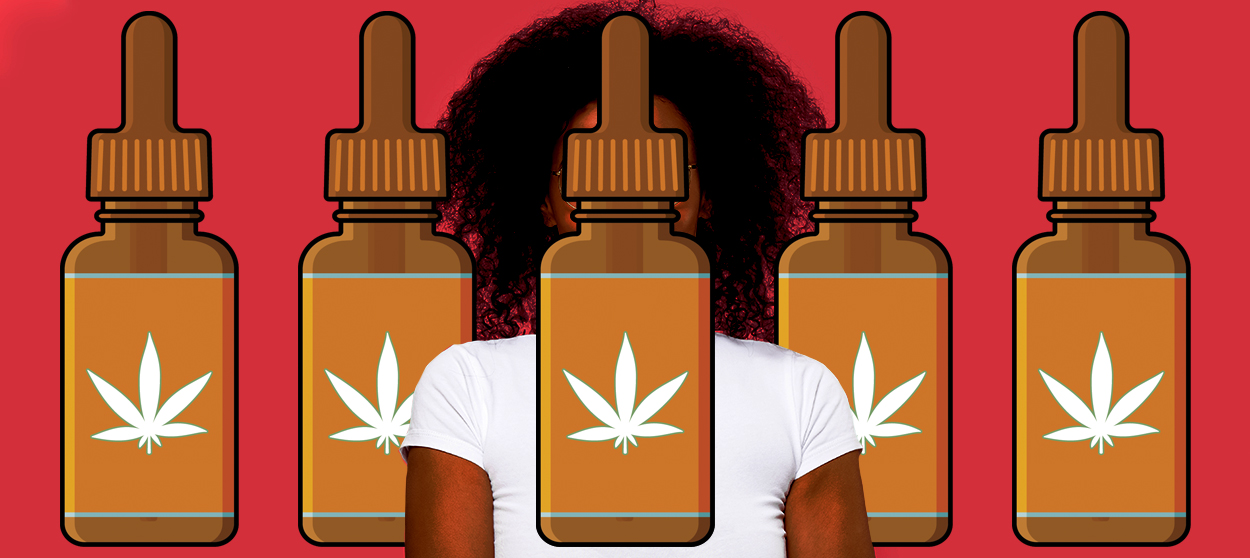How the CBD industry is leaving women of color behind
Cannabidiol has gone from wellness panacea to luxury item, and not everyone is benefiting


A free daily email with the biggest news stories of the day – and the best features from TheWeek.com
You are now subscribed
Your newsletter sign-up was successful
The cannabidiol (CBD) industry is seeing phenomenal growth: By next year, it is expected to be worth more than $1 billion. The oil is becoming particularly popular among women. A report found that the number of women using CBD doubled in 2018. But as the CBD craze continues, are women of color being left behind?
CBD is an extract derived from the hemp plant and touted by the wellness industry as a cure-all for everything from chronic pain to seizures to anxiety — all without the unwanted side effects of other drugs. One survey found that 42 percent of CBD users say they're using it instead of "traditional" medications.
Sure, CBD may be the latest and greatest panacea. Unfortunately, it comes with a hefty price tag. For a "standard" 30 milliliter bottle containing 500 milligrams of CBD, one can expect to shell out around $75. And the cost really only goes up: One 1500-milligram dose from a company called Miss Grass retails for nearly $250. That's hardly affordable for most, and that's especially true if money is already tight, which is more likely to be the case for women, and especially women of color. White women make 80 cents for every dollar a white, non-Hispanic man makes. But black women are paid 61 cents, Native women 58 cents, and Latinx women 53 cents for every dollar a white, non-Hispanic man makes. Meanwhile, the unemployment rate for black women is double that for white women.
The Week
Escape your echo chamber. Get the facts behind the news, plus analysis from multiple perspectives.

Sign up for The Week's Free Newsletters
From our morning news briefing to a weekly Good News Newsletter, get the best of The Week delivered directly to your inbox.
From our morning news briefing to a weekly Good News Newsletter, get the best of The Week delivered directly to your inbox.
Another problem is the lack of diverse representation within the CBD industry itself. As Bustle notes, women of color account for only five percent of senior roles in the cannabis industry. Raeven Duckett, a board member of Supernova Women, an organization that aims to empower women of color in the cannabis industry, speculated that this "goes back to the War on Drugs in the '80s and the '90s, where smoking weed, having an ounce of weed on you, could mean you're going to jail, you're ruining your life; a whole lot of like negative impacts ... [White people] weren't getting arrested, they weren't going to jail, and their families weren't getting torn apart as often and as horribly as black people."
This makes a lot of sense. There exists an enduring, underlying bias surrounding drugs and people of color. And while CBD doesn't contain any tetrahydrocannabinol (THC) — the stuff in pot that gets users high — and even though the medical usage of pot is legal in 33 states and recreationally in 10 anyway, for people of color, the trauma from the War on Drugs still lingers. Between 2001 and 2010, black people were nearly four times more likely than white people to be arrested for possession of marijuana.
As a report from the ACLU puts it: "Despite the fact that marijuana is used at comparable rates by whites and blacks, state and local governments have aggressively enforced marijuana laws selectively against black people and communities … It is not surprising that the War on Marijuana, waged with far less fanfare than the earlier phases of the drug war, has gone largely, if not entirely, unnoticed by middle- and upper-class white communities."
Making all of this worse is the fact that women of color may be in most need of the touted benefits of CBD. Women are already twice as anxious as men, and research shows anxiety is chronic and more intense for black women than it is for white women. The U.S. health-care system is also riddled with racial bias: Doctors are less likely to prescribe black patients pain medications or to take their complaints seriously. An anxiety-reducing, pain-relieving oil one can buy without a prescription, and without breaking the bank, could have the potential to benefit the black community tremendously. But instead of making it more accessible across the board, companies are turning CBD into a "luxury" product. W Magazine touts Miss Grass the "Goop of Cannabis." Barney's recently launched a head shop. Neiman Marcus is lining its shelves with "high-end" CBD products.
A free daily email with the biggest news stories of the day – and the best features from TheWeek.com
When CBD companies create pricey tinctures, they perpetuate inequalities in terms of affordability, and they leave the most disenfranchised behind.
Bonnie Horgos is a freelance writer based in Minneapolis, Minnesota. She specializes in pieces analyzing the intersection of mental health, sobriety, and feminism, as well as LGBTQ issues. She's written for HuffPost, Elite Daily, Bustle, SheKnows, The Kitchn, and other publications.
-
 How the FCC’s ‘equal time’ rule works
How the FCC’s ‘equal time’ rule worksIn the Spotlight The law is at the heart of the Colbert-CBS conflict
-
 What is the endgame in the DHS shutdown?
What is the endgame in the DHS shutdown?Today’s Big Question Democrats want to rein in ICE’s immigration crackdown
-
 ‘Poor time management isn’t just an inconvenience’
‘Poor time management isn’t just an inconvenience’Instant Opinion Opinion, comment and editorials of the day
